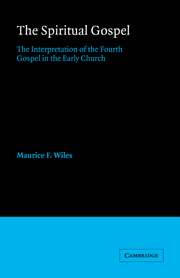Book contents
- Frontmatter
- Contents
- ACKNOWLEDGEMENTS
- ABBREVIATIONS
- INTRODUCTION Commentaries and commentators
- I The authorship and purpose of the Gospel
- II The Fourth Gospel and the Synoptic Gospels
- III Historicity and symbolism
- IV The signs
- V Leading ideas of the Gospel
- VI The Fourth Gospel and the Gnostics
- VII Christological interpretation in the third and fourth centuries
- VIII The Christological exegesis of Theodore and Cyril
- IX The Gospel of salvation
- EPILOGUE An assessment
- BIBLIOGRAPHY
- INDEX OF PROPER NAMES
- INDEX OF TEXTS
IX - The Gospel of salvation
Published online by Cambridge University Press: 06 March 2010
- Frontmatter
- Contents
- ACKNOWLEDGEMENTS
- ABBREVIATIONS
- INTRODUCTION Commentaries and commentators
- I The authorship and purpose of the Gospel
- II The Fourth Gospel and the Synoptic Gospels
- III Historicity and symbolism
- IV The signs
- V Leading ideas of the Gospel
- VI The Fourth Gospel and the Gnostics
- VII Christological interpretation in the third and fourth centuries
- VIII The Christological exegesis of Theodore and Cyril
- IX The Gospel of salvation
- EPILOGUE An assessment
- BIBLIOGRAPHY
- INDEX OF PROPER NAMES
- INDEX OF TEXTS
Summary
The dominant conception of salvation in the whole tradition of early Greek theology is the bridging of the gap between the human and the divine, the mortal and the immortal, in the person of the Godman Christ Jesus. The nature of the union of human and divine in his person is thus directly related to the nature of the salvation that he brought. In this basic presupposition Theodore and Cyril are at one. Moreover, if there is any one major strand of New Testament thought from which this whole tradition springs it is the thought of the Fourth Gospel. Therefore a comparison of their exegesis of this aspect of the Gospel's thought provides a useful medium for the comparison of their fundamental religious ideas and of the extent of their rooting in the Biblical tradition.
Theodore's exposition of this redemptive function of the incarnation is, as we would expect, the simpler but not necessarily the more profound. God-the-word is by nature united to the Father. The ‘homo assumptus’ is similarly united by nature to us. God-theword has through the mediation of the Spirit taken this ‘man’ into the closest ‘conjunctio’ or ‘familiaritas’ with himself. What Christ's ‘man’ or human nature has first received, we receive in our turn, in so far as it is possible for us to do so. We are linked through our oneness with Christ's human nature in the first place to the Word, and thereby are brought to the ultimate goal of ‘familiaritas’ with the Father.
- Type
- Chapter
- Information
- The Spiritual GospelThe Interpretation of the Fourth Gospel in the Early Church, pp. 148 - 157Publisher: Cambridge University PressPrint publication year: 1960



